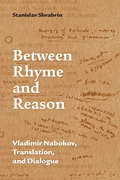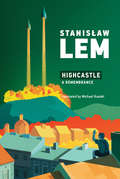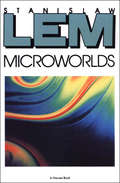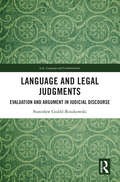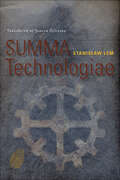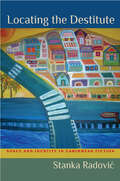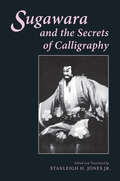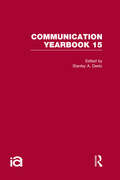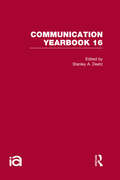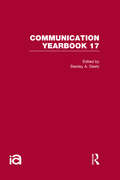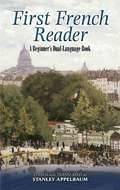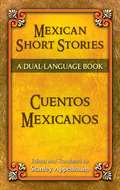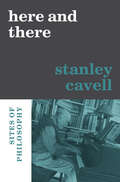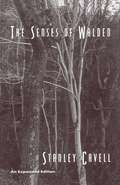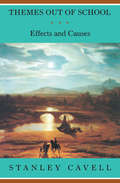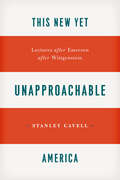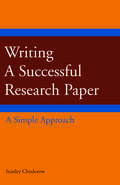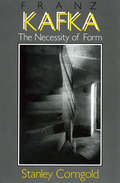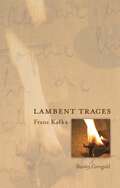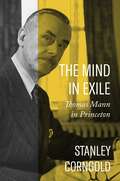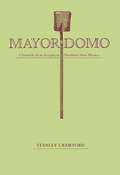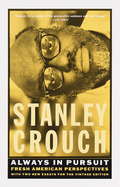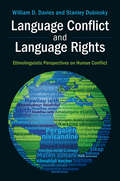- Table View
- List View
Between Rhyme and Reason: Vladimir Nabokov, Translation, and Dialogue
by Stanislav ShvabrinThe author of such global bestsellers as Lolita and Pale Fire, Vladimir Nabokov (1899–1977) is also the most controversial literary translator and translation theorist of our time. In Between Rhyme and Reason, Stanislav Shvabrin discloses the complexity, nuance, and contradictions behind the writer’s theory and practice of "literalism" to reveal how and why translation came to matter to him so much. Drawing on familiar as well as unknown materials, Shvabrin traces the surprising and largely unknown trajectory of Nabokov’s life-long fascination with translation to demonstrate that, for him, translation was a form of intellectual communion with his peers across no fewer than six languages. Empowered by Mikhail Bakhtin’s insights into the interactive roots of literary creativity, Shvabrin’s interpretative chronicle of Nabokov’s involvement with translation shows how his "dialogic encounters" with others in the medium of translation left "verbal vestiges" on his creations. Refusing to regard translation as a form of individual expression, Nabokov translated to communicate with his interlocutors whose words and images continue to reverberate throughout his allusion-rich texts.
Highcastle: A Remembrance
by Stanislaw LemA playful, witty, reflective memoir of childhood by the science fiction master Stanisław Lem. With Highcastle, Stanisław Lem offers a memoir of his childhood and youth in prewar Lvov. Reflective, artful, witty, playful—“I was a monster,” he observes ruefully—this lively and charming book describes a youth spent reading voraciously (he was especially interested in medical texts and French novels), smashing toys, eating pastries, and being terrorized by insects. Often lonely, the young Lem believed that he could communicate with household objects—perhaps anticipating the sentient machines in the adult Lem's novels. Lem reveals his younger self to be a dreamer, driven by an unbridled imagination and boundless curiosity. In the course of his reminiscing, Lem also ponders the nature of memory, innocence, and the imagination. Highcastle (the title refers to a nearby ruin) offers the portrait of a writer in his formative years.
Microworlds
by Stanislaw LemThe author of Solaris critiques science fiction in a collection of provocative essays. Celebrated science fiction master Stanislaw Lem turns his always sharp and insightful pen to criticism in this bold and controversial analysis of the genre for which he is most known. In this collection of ten essays—ranging from an introspective examination of his own biographical and literary history to biting scrutiny of fellow authors and their works—Lem takes a keen look at the influence, shortcomings, merit, and importance of science fiction, touching on topics from Philip K. Dick (&“a genius among the charlatans&”) to time travel, cosmology, and Jorge Luis Borges. Whether deriding the genre&’s tendency to adhere to well-worn patterns of adventure or lauding its ability to, when executed correctly, discover ideas that have not been thought of or done before, Lem&’s quick wit, razor tongue, and impeccable insights make Microworlds a master class of scientific and literary analysis from one of the undisputed legends of science fiction.
Language and Legal Judgments: Evaluation and Argument in Judicial Discourse (Law, Language and Communication)
by Stanisław Goźdź-RoszkowskiIntegrating research methods from Linguistics with contemporary Legal Argumentation Theory, this book highlights the complexities of legal justification by focusing on the role of value-laden language in argument construction and use. The combination of linguistic analysis and the pragma-dialectic approach to legal argumentation yields a new way of perceiving and understanding the phenomenon of evaluation, one that offers theoretical and practical gains. Analyzing a vast corpus of judicial opinions from the United States Supreme Court and Poland’s Constitutional Court, the book paints a clear picture of complex linguistic choices made by judges to assess and support arguments in the justifications of their decisions. The book will be of interest to scholars in Law, Linguistics and Rhetoric, as well as to judges and practicing lawyers engaged in the art of argumentation.
Summa Technologiae (Electronic Mediations #40)
by Stanisław LemThe Polish writer Stanislaw Lem is best known to English-speaking readers as the author of the 1961 science fiction novel Solaris, adapted into a meditative film by Andrei Tarkovsky in 1972 and remade in 2002 by Steven Soderbergh. Throughout his writings, comprising dozens of science fiction novels and short stories, Lem offered deeply philosophical and bitingly satirical reflections on the limitations of both science and humanity.In Summa Technologiae—his major work of nonfiction, first published in 1964 and now available in English for the first time—Lem produced an engaging and caustically logical philosophical treatise about human and nonhuman life in its past, present, and future forms. After five decades Summa Technologiae has lost none of its intellectual or critical significance. Indeed, many of Lem&’s conjectures about future technologies have now come true: from artificial intelligence, bionics, and nanotechnology to the dangers of information overload, the concept underlying Internet search engines, and the idea of virtual reality. More important for its continued relevance, however, is Lem&’s rigorous investigation into the parallel development of biological and technical evolution and his conclusion that technology will outlive humanity.Preceding Richard Dawkins&’s understanding of evolution as a blind watchmaker by more than two decades, Lem posits evolution as opportunistic, shortsighted, extravagant, and illogical. Strikingly original and still timely, Summa Technologiae resonates with a wide range of contemporary debates about information and new media, the life sciences, and the emerging relationship between technology and humanity.
Locating the Destitute: Space and Identity in Caribbean Fiction (New World Studies)
by Stanka RadovicWhile postcolonial discourse in the Caribbean has drawn attention to colonialism’s impact on space and spatial hierarchy, Stanka Radović asks both how ordinary people as "users" of space have been excluded from active and autonomous participation in shaping their daily spatial reality and how they challenge this exclusion. In a comparative interdisciplinary reading of anglophone and francophone Caribbean literature and contemporary spatial theory, she focuses on the house as a literary figure and the ways that fiction and acts of storytelling resist the oppressive hierarchies of colonial and neocolonial domination. The author engages with the theories of Henri Lefebvre, Michel Foucault, and contemporary critical geographers, in addition to selected fiction by V. S. Naipaul, Patrick Chamoiseau, Beryl Gilroy, and Rafaël Confiant, to examine the novelists’ construction of narrative "houses" to reclaim not only actual or imaginary places but also the very conditions of self-representation.Radović ultimately argues for the power of literary imagination to contest the limitations of geopolitical boundaries by emphasizing space and place as fundamental to our understanding of social and political identity. The physical places described in these texts crystallize the protagonists’ ambiguous and complex relationship to the New World. Space is, then, as the author shows, both a political fact and a powerful metaphor whose imaginary potential continually challenges its material limitations.
Sugawara and the Secrets of Calligraphy (Translations from the Asian Classics)
by Stanleigh Jones Jr.Sugawara and the Secrets of Calligraphy is a classic play from Japan's golden age of puppet theater. Written in the eighteenth century, it tells the tale of Sugawara no Michizane, a wronged scholar-official who, in death, joins the Shinto pantheon as a nurturer of scholarship and calligraphy. The story recounts Sugawara's entanglement with the powerful Fujiwara family, who accuse Sugawara of plotting against the emperor, resulting in his exile and death in 903. After a series of misfortunes befall those who conspired against him, Sugawara's enemies appease his spirit through deification. Sugawara and the Secrets of Calligraphy centers on three archetypical brothers and their wives. Their fates unfold against the intrigues surrounding Sugawara and his foes, which reflect the cultural values of the Edo period woven into a stylized past. This annotated translation by Stanleigh H. Jones Jr. replicates the play's poetic and idiomatic language and its original mix of register while also clarifying the drama's complex story and dialogue for students of Japanese literature and drama. An introduction situates the play within its eighteenth-century context and ninth-century setting and describes the relationship between bunraku puppet theater and kabuki. A unique illustrated appendix delves into the construction of puppets and the art of puppetry.
Communication Yearbook 15
by Stanley A. DeetzFirst published in 2012. Routledge is an imprint of Taylor & Francis, an informa company.
Communication Yearbook 16
by Stanley A. DeetzFirst published in 2012. Routledge is an imprint of Taylor & Francis, an informa company.
Communication Yearbook 17
by Stanley A. DeetzDivided into four sections, Communication Yearbook 17 focuses on interpersonal interaction, especially the constitutive processes within everyday communication, and is intended to complement the mass media focus of Communication Yearbooks 15 and 16. The second section focuses on message characteristics and what messages do in interaction. Section III considers value and policy issues in light of the ubiquitous nature of communication media and cultural pluralism. The final section discusses the future of communication studies and its potential social contribution. Commentaries on each chapter provide alternative perspectives ont he state of current research, extend issues of significance and help engage the reader in the contemporary debates of each area.
First French Reader: A Beginner's Dual-Language Book
by Stanley AppelbaumThis excellent anthology offers the beginning French-language student a first taste of some of the world's most significant prose. Chosen for both their eloquence and ease of reading, excerpts from such masterpieces as Les Misérables, The Red and the Black, Madame Bovary, Carmen, and The Three Musketeers will open new worlds for linguists. Readers will savor the words of fifty great writers of multiple genres from the seventeenth through twentieth centuries, including Voltaire, Rousseau, Balzac, Baudelaire, Dumas, Proust, and other literary virtuosos.Lucid and accessible, the unabridged English translations by Stanley Appelbaum appear on pages that face the original French text. Literature lovers, French-language students, and other readers will find this volume a fascinating exploration of French literature...and an invaluable aid to mastering one of the world's most romantic languages.
Mexican Short Stories / Cuentos mexicanos: A Dual-Language Book
by Stanley AppelbaumGreatly influenced by Europe's nineteenth-century literary trends, Mexico's writers crafted some of the most phenomenal prose fiction in Spanish America. This collection offers a rich sampling of significant Mexican short stories published from 1843 to 1918. Nine different tales range from the realism of López Portillo's "Reloj sin dueño" and the modernismo saturating Gutiérrez Nájera's "La mañana de San Juan" to the historical accuracy of Riva Palacio's "Las mulas de Su Excelencia" and the vivid romanticism of "Amor secreto" by Manuel Payno, named the "father of Mexican short stories." Each story appears in its original Spanish text with expert English translations on each facing page. This dual-language edition features a fascinating new introduction and ample footnotes. An easy-reading pleasure for lovers of fine Spanish-language literature, it is also a valuable educational aid for students and teachers.
Disowning Knowledge: In Seven Plays of Shakespeare
by Stanley CavellReissued with a new essay on Macbeth this famous collection of essays on Shakespeare's tragedies considers these plays as responses to the crisis of knowledge and the emergence of modern skepticism provoked by the new science of the late sixteenth and early seventeenth centuries.
Here and There: Sites of Philosophy
by Stanley CavellThe first posthumous collection from the writings of Stanley Cavell, shedding new light on the distinctive vision and intellectual trajectory of an influential American philosopher. For Stanley Cavell, philosophy was a matter of responding to the voices of others. Throughout his career, he articulated the belief that words spring to life in concrete circumstances of speech: the significance and power of language depend on the occasions that elicit it. When Cavell died in 2018, he left behind some of his own most powerful language—a plan for a book collecting numerous unpublished essays and lectures, as well as papers printed in niche journals. Here and There presents this manuscript, with thematically relevant additions, for the first time. These writings, composed between the 1980s and the 2000s, reflect Cavell’s expansive interests and distinctive philosophical method. The collection traverses all the major themes of his immense body of work: modernity, psychoanalysis, the human voice, moral perfectionism, tragedy, skepticism. Cavell’s rich and cohesive philosophical vision unites his wide-ranging engagement with poets, critics, psychoanalysts, social scientists, and fellow philosophers. In Here and There, readers will find dialogues with Shakespeare, Thoreau, Wittgenstein, Freud, Heidegger, Walter Benjamin, Wallace Stevens, Veena Das, and Peter Kivy, among others. One of the collection’s most striking features is an ensemble of five pieces on music, constituting Cavell’s first discussion of the subject since the mid-1960s. Edited by philosophers who have been invested in Cavell’s work for decades, Here and There not only gathers the strands of a writing life but also maps its author’s intellectual journeys. In these works, Cavell models what it looks like to examine seriously one’s own passions and to forge new communities through unexpected conversations.
The Senses of Walden
by Stanley CavellStanley Cavell, one of America's most distinguished philosophers, has written an invaluable companion volume to Walden, a seminal book in our cultural heritage. This expanded edition includes two essays on Emerson.
The Senses of Walden: An Expanded Edition
by Stanley CavellStanley Cavell, one of America's most distinguished philosophers, has written an invaluable companion volume to Walden, a seminal book in our cultural heritage. This expanded edition includes two essays on Emerson.
Themes Out Of School: Effects and Causes
by Stanley CavellIn the first essay of this book, Stanley Cavell characterizes philosophy as a "willingness to think not about something other than what ordinary human beings think about, but rather to learn to think undistractedly about things that ordinary human beings cannot help thinking about, or anyway cannot help having occur to them, sometimes in fantasy, sometimes as a flash across a landscape. " Fantasies of film and television and literature, flashes across the landscape of literary theory, philosophical discourse, and French historiography give Cavell his starting points in these twelve essays. Here is philosophy in and out of "school," understood as a discipline in itself or thought through the works of Shakespeare, Molière, Kierkegaard, Thoreau, Brecht, Makavejev, Bergman, Hitchcock, Astaire, and Keaton.
This New Yet Unapproachable America: Lectures after Emerson after Wittgenstein (Frederick Ives Carpenter Lectures; Ser.)
by Stanley CavellStanley Cavell is a titan of the academic world; his work in aesthetics and philosophy has shaped both fields in the United States over the past forty years. In this brief yet enlightening collection of lectures, Cavell investigates the work of two of his most tried-and-true subjects: Emerson and Wittgenstein. Beginning with an introductory essay that places his own work in a philosophical and historical context, Cavell guides his reader through his thought process when composing and editing his lectures while making larger claims about the influence of institutions on philosophers, and the idea of progress within the discipline of philosophy. In “Declining Decline,” Cavell explains how language modifies human existence, looking specifically at the culture of Wittgenstein’s writings. He draws on Emerson, Thoreau, and many others to make his case that Wittgenstein can indeed be viewed as a “philosopher of culture.” In his final lecture, “Finding as Founding,” Cavell writes in response to Emerson’s “Experience,” and explores the tension between the philosopher and language—that he or she must embrace language as his or her “form of life,” while at the same time surpassing its restrictions. He compares finding new ideas to discovering a previously unknown land in an essay that unabashedly celebrates the power and joy of philosophical thought.
Writing a Successful Research Paper: A Simple Approach
by Stanley ChodorowThis brief, practical guide offers a clear and comprehensive strategy for conceptualizing, approaching, and executing the task of writing a research paper in the humanities and social sciences. In addition, it provides: a critical and process-oriented approach to the tasks of topic selection, formulation of the research question, thesis development, and argumentation.judiciously selected examples drawn from a broad range of disciplines.concise treatment of the aims, methods, and conventions of scholarly research, including the opportunities and pitfalls of Internet use.a wealth of conceptual and organizational tools, and more.
Franz Kafka: The Necessity of Form
by Stanley CorngoldIn Stanley Corngold’s view, the themes and strategies of Kafka’s fiction are generated by a tension between his concern for writing and his growing sense of its arbitrary character. Analyzing Kafka’s work in light of "the necessity of form," which is also a merely formal necessity, Corngold uncovers the fundamental paradox of Kafka’s art and life. The first section of the book shows how Kafka’s rhetoric may be understood as the daring project of a man compelled to live his life as literature. In the central part of the book, Corngold reflects on the place of Kafka within the modern tradition, discussing such influential precursors of Cervantes, Flaubert, and Nietzsche, whose works display a comparable narrative disruption. Kafka’s distinctive narrative strategies, Corngold points out, demand interpretation at the same time they resist it. Critics of Kafka, he says, must be aware that their approaches are guided by the principles that Kafka’s fiction identifies, dramatizes, and rejects.
Lambent Traces: Franz Kafka
by Stanley CorngoldOn the night of September 22, 1912, Franz Kafka wrote his story "The Judgment," which came out of him "like a regular birth." This act of creation struck him as an unmistakable sign of his literary destiny. Thereafter, the search of many of his characters for the Law, for a home, for artistic fulfillment can be understood as a figure for Kafka's own search to reproduce the ecstasy of a single night. In Lambent Traces: Franz Kafka, the preeminent American critic and translator of Franz Kafka traces the implications of Kafka's literary breakthrough. Kafka's first concern was not his responsibility to his culture but to his fate as literature, which he pursued by exploring "the limits of the human." At the same time, he kept his transcendental longings sober by noting--with incomparable irony--their virtual impossibility. At times Kafka's passion for personal transcendence as a writer entered into a torturous and witty conflict with his desire for another sort of transcendence, one driven by a modern Gnosticism. This struggle prompted him continually to scrutinize different kinds of mediation, such as confessional writing, the dream, the media, the idea of marriage, skepticism, asceticism, and the imitation of death. Lambent Traces: Franz Kafka concludes with a reconstruction and critique of the approaches to Kafka by such major critics as Adorno, Gilman, and Deleuze and Guattari..
The Mind in Exile: Thomas Mann in Princeton
by Stanley CorngoldA unique look at Thomas Mann’s intellectual and political transformation during the crucial years of his exile in the United StatesIn September 1938, Thomas Mann, the Nobel Prize–winning author of Death in Venice and The Magic Mountain, fled Nazi Germany for the United States. Heralded as “the greatest living man of letters,” Mann settled in Princeton, New Jersey, where, for nearly three years, he was stunningly productive as a novelist, university lecturer, and public intellectual. In The Mind in Exile, Stanley Corngold portrays in vivid detail this crucial station in Mann’s journey from arch-European conservative to liberal conservative to ardent social democrat.On the knife-edge of an exile that would last fully fourteen years, Mann declared, “Where I am, there is Germany. I carry my German culture in me.” At Princeton, Mann nourished an authentic German culture that he furiously observed was “going to the dogs” under Hitler. Here, he wrote great chunks of his brilliant novel Lotte in Weimar (The Beloved Returns); the witty novella The Transposed Heads; and the first chapters of Joseph the Provider, which contain intimations of his beloved President Roosevelt’s economic policies. Each of Mann’s university lectures—on Goethe, Freud, Wagner—attracted nearly 1,000 auditors, among them the baseball catcher, linguist, and O.S.S. spy Moe Berg. Meanwhile, Mann had the determination to travel throughout the United States, where he delivered countless speeches in defense of democratic values.In Princeton, Mann exercised his “stupendous capacity for work” in a circle of friends, all highly accomplished exiles, including Hermann Broch, Albert Einstein, and Erich Kahler. The Mind in Exile portrays this luminous constellation of intellectuals at an extraordinary time and place.
Mayordomo: Chronicle of an Acequia in Northern New Mexico
by Stanley CrawfordIrrigation ditches are the lifelines of agriculture and daily life in rural New Mexico. This award-winning account of the author's experience as a mayordomo, or ditch boss, is the first record of the life of an acequia by a community participant.
Always in Pursuit
by Stanley CrouchAs a cultural and political commentator, Stanley Crouch in unapologetically contentious and delightfully iconoclastic. Whether he is writing on the uniqueness of the American South, the death of Tupak Shakur, the O.J. Simpson verdict, or the damage done by the Oklahoma City bombing, Crouch's high-velocity exchange with American culture is conducted with scrupulous allegiance to the truth, even when it hurts--and it usually does. And on the subject of jazz--from Sidney Bechet to Billy Strayhorn, Duke Ellington to Miles Davis--there is no one more articulate, impassioned, and encyclopedic in his knowledge than Stanley Crouch. Crouch approaches everything in his path with head-on energy, restless intelligence, and a refreshing faith in the collective experiment that is America--and he does so in a virtuosic prose style that is never less than thrilling.From the Trade Paperback edition.learn from him."--Robert Pinsky, Poet Laureate"Stanley Crouch once again proves himself to be a major iconoclast. His words prick the pages, provoking, irritating, prodding us to question our own easy assumptions on race, sex, politics, art, jazz, history, civilization, you-name-it. His pursuit becomes our own, as we see our world through his bold eyes."--Linda Chavez"The essay on O. J. Simpson is among the most sensible and incisive writing from the mountain of commentary that that unfortunate case has produced. Crouch remains one of our most formidable social and literary critics." --Gerald Early"Always in Pursuit is everything I love about the brilliant Stanley Crouch. In his hands the essay becomes a great jazz riff on the page--social commentary rightly done as a singular 'I'. Written by a passionately determined believer in the American possibility, this collection of essays is wide ranging, fiercely opinionated, elegantly composed, purposefully challenging. Be prepared."--Marcia Gillespie, Editor-in-Chief, Ms. Magazine
Language Conflict and Language Rights: Ethnolinguistic Perspectives on Human Conflict
by Stanley Dubinsky William D. DaviesAs the colonial hegemony of empire fades around the world, the role of language in ethnic conflict has become increasingly topical, as have issues concerning the right of speakers to choose and use their preferred language(s). Such rights are often asserted and defended in response to their being violated. The importance of understanding these events and issues, and their relationship to individual, ethnic, and national identity, is central to research and debate in a range of fields outside of, as well as within, linguistics. This book provides a clearly written introduction for linguists and non-specialists alike, presenting basic facts about the role of language in the formation of identity and the preservation of culture. It articulates and explores categories of conflict and language rights abuses through detailed presentation of illustrative case studies, and distills from these key cross-linguistic and cross-cultural generalizations.
